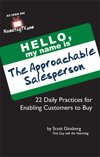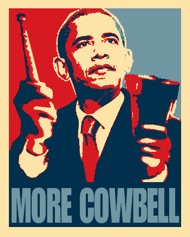 Caring is not an emotion – it’s an intersection.
Caring is not an emotion – it’s an intersection.
It’s the loving collision between your attention and someone else’s need.
HOWEVER: Caring can’t be bastardized into a technique.
The secret is to develop a keener eye for those moments in which care is needed.
Here’s how:1. Look past when a bend is needed. Most policies are prepared excuses. And organizations use them to create insurance, stay in control, enable deniability, preserve the illusion of safety and cover their ass when things go wrong. So much for caring.
Instead of deleting all your policies, create a litmus test to gauge the value of your policies.
If the policy prevents you from wowing a customer, it shouldn’t exist. If the policy focuses on the person and not the behavior, it shouldn’t exist. And the policy protects the president’s ego at the cost of employee respect, it shouldn’t exist.
Every customer is an exception. Break rules, not hearts. Flexibility buys longevity. Are the policies you’re hiding behind offending and insulting customers?
2. Speak out when a voice is needed. Beth Brooke, Global Vice Chair of Ernst & Young once said, “Every one of us has a platform. It changes over time and looks different for every individual, but we all have one. Use it to make a difference.”
The advantage is: There has never been a better time in history to reach the world. But the question is: What is the world begging you to give voice to? To find an answer, get online. Take advantage of every listening post you can find.
After all, social media isn’t a sales tool – it’s a hearing aid. And it’s the single greatest way to pinpoint the issues your platform needs to give voice to.
Remember: When a voice is needed, closed lips are an obscenity. What did you publish this week?
3. Back off when a lesson is needed. Yes, it would be easier to tell your cousin that her boyfriend is a manipulative jerk. But sometimes the best way to care is to get the hell out of the way. Sometimes you have to give people enough space to learn things on their own. Otherwise the desire to fix blocks the ability to care. And it becomes very hard to breathe out the love people need.
Next time you feel your eye twitching, practice a little emotional restraint. Stop adding value. Suspend the need to dominate the conversation. And respect the other person’s speed of self-discovery. Eventually, she’ll come to her senses and break up with him. On Jerry Springer. What happened to the last person you tried to fix?
4. Jump in when a leader is needed. You can’t sit back and wait for people to build something that inspires you. Nor can you sit back and wait for people to rebuild something doesn’t inspire you. The only hope is to nominate yourself. To instigate the change that you believe in. And to make the choice not to do nothing anymore.
Otherwise it’s going to eat away at your heart to watch a leaderless world go by.
People are waiting for you to lead them. People are waiting for you to take them to the Promised Land. Stop waiting for a savior and sign up for the initiative path. Are you still hiding from the fear of leading?
5. Ante up when a commitment is needed. I’m hopeless when it comes to organization, details and planning. The stuff makes my blood freeze. But, if there’s someone I love who’s counting on my ability to manage a situation, I’ll be on top of it like a hungry bear on a slow running camper.
That’s the way I see it: You don’t have to be good at something to care about it. And, just because you failed to focus on it in the past doesn’t mean you’re incapable of excelling at it in the future. Turns out, life is more interested in your willingness to commit that your capacity to win.
That’s the thing about caring: It isn’t always about knowing how to do things. It’s about knowing why it’s important to do them, and then, allowing the how to find its way in through the side door. Who is waiting for you to commit?
6. Stay close when a heart is needed. I understand your hesitation. Opening up is terrifying. When you give someone your heart, there’s always the chance that they’ll give it back to you in pieces. That’s the brand of vulnerability you invite when you dare to care.
And I’ve been burned by it before. A couple of times. But life without risk, isn’t. You can’t outsmart getting hurt. And you can’t stay one step ahead of the pain forever. Eventually, you have to lean into it.
Come on. If there’s a person who needs you – and you believe that staying close is a chance worth taking – take it. Show them that they’re worth being strong for. People don’t forget. Who desperately needs access to your heart?
REMEMBER: Caring is the intersection between your attention and someone else’s need.
Keep your eyes open for opportunities to make that loving collision.
LET ME ASK YA THIS…
What’s your care quotient?
LET ME SUGGEST THIS…
For the list called, “5 Creative Ways to Approach the Sale,” send an email to me, and you win the list for free!
* * * *
Scott Ginsberg
That Guy with the Nametag
Author, Speaker, Publisher, Artist, Mentor
[email protected]
Now booking for 2011-2012!
Watch The Nametag Guy in action here!



 Any time you attend a meeting, make a sales call, give a presentation, write a blog or interview with a prospective employer, you have a choice:
Any time you attend a meeting, make a sales call, give a presentation, write a blog or interview with a prospective employer, you have a choice: When it comes to design, less is more.
When it comes to design, less is more. Any time you attend a meeting, make a sales call, give a presentation, write a blog or interview with a prospective employer, you have a choice:
Any time you attend a meeting, make a sales call, give a presentation, write a blog or interview with a prospective employer, you have a choice: Few ideas in history have been more widely repeated, debated and dissected than the following three words:
Few ideas in history have been more widely repeated, debated and dissected than the following three words: “I usually refuse to pay for mentoring. But after Scott’s first brain rental session, the fact that I had paid something to be working with him left my mind – as far as I was concerned, the value of that (and subsequent) exchange of wisdom and knowledge, far outweighed any payment.”
“I usually refuse to pay for mentoring. But after Scott’s first brain rental session, the fact that I had paid something to be working with him left my mind – as far as I was concerned, the value of that (and subsequent) exchange of wisdom and knowledge, far outweighed any payment.” Enough is enough.
Enough is enough. You’ve chosen an uncertain path.
You’ve chosen an uncertain path. You’ve probably never heard of Gershon Legman.
You’ve probably never heard of Gershon Legman.